- Home
- Trevor Hoyle
Through the Eye of Time Page 15
Through the Eye of Time Read online
Page 15
How could a species of ultra-sub-atomic particles interfere in a squalid and rather obscure war which had taken place hundreds of years Pre-Colonization? Was it perhaps a simulation exercise in which anti-Hadrons assumed the infrastructure of a period and followed the events through to their logical (or in this instance, illogical) conclusion? A kind of historical reconstruction on a cosmic scale?
If the How was baffling, the Why was doubly so. Assuming that the Hadrons were a form of subnuclear intelligence roaming at will through the universe, what possible motive could they have for creating a mythical landscape? Perhaps they were unaware of the havoc they were causing in this stratum of spacetime, knew nothing and cared even less about disrupting the decay rates of particles which comprised Karve’s universe. There was no reason to regard them as possessing evil intent. They were intelligent, and being intelligent presumably had moral and ethical codes of behaviour; but just as a man will crush minute organisms by walking on them, totally blameless, not wishing them harm, so the Hadrons could trample unthinkingly on an organism they only dimly perceived, if at all.
‘They could be here now, in this room,’ Karve murmured. ‘And neither of us is aware of the presence of the other.’
Two alien life-forms moving through each other, one in time, the other in minus time, just occasionally the two indistinct edges of their spacetime continuums meeting at the matter/anti-matter interface.
The tea in the pot, when he remembered to pour it, was lukewarm. He drank it unsweetened, with a slice of lemon, and contemplated the material piled on the desk in front of him.
The First Assistant apologized for disturbing him but said that Queghan’s wife was in the outer office; could he spare the time to see her? She was pale, composed, and sat down immediately in the chair, frowning at the carpet. He offered her some tea but she didn’t respond.
‘Have you seen him, Johann?’
Karve saw that she wore no make-up and that her blond hair was brushed severely back from the face, catching a reflected sheen of light from the window. He put the cup and saucer on the tray. ‘No, I haven’t. They’re keeping me informed of his progress. There’s no need to worry.’
‘It was my fault.’
‘Nonsense.’
‘This time it was my fault,’ she said more firmly.
Karve made a small helpless gesture and said, ‘You’ve been married to him, long enough now to know that these attacks are unavoidable. Sometimes they can be controlled and sometimes we have to let them run their course. We have all the facilities in Psycho-Med to ensure he receives the best possible attention. Karla Ritblat is expert in this field; Chris couldn’t be in better hands.’
‘I don’t doubt her ability,’ Oria said, gazing at the floor. ‘But I nearly let him die. He was having an attack and I just used it as part of my fantasy. He could have been lying dead in the chair and I’d have gone on acting out my silly dreamscapes.’
‘That didn’t happen.’
‘It could have.’
‘But it didn’t.’ Karve looked at her steadily. ‘We can’t concern ourselves with what might have been, only with what is,’ yet even as he said this he realized with mocking self-deprecation that he spent his entire professional life concerning himself with statistical probabilities – the might-have-been as distinct from actual everyday reality. In some probable alternative scenario Queghan could have died, would have done, and had.
He said, ‘Have you been to see him?’
‘Yes, just now. He’s still in coma.’ She made an attempt to smile. ‘At least I did the right thing in giving him the Dilantin. I nearly didn’t find that until it was too late. What a bloody hopeless stupid broad I am. Jeez.’
It seemed to Karve that she felt an obligation to break down. The real emotion was lacking, although unshed tears weren’t enough to expiate her remorse. He tried to comfort her.
‘Chris is going to be all right. Within a week, ten days, he’ll be back on his feet. Karla told me herself that there’s no cause for alarm. Oria, I promise you that he’ll pull through. Chris is a tough customer to get rid of.’
‘But with my help he’ll manage it.’
‘Don’t be stupid, you love him, you don’t wish him harm—’
‘Why don’t you tell me that I’m just upset and I’ll get over it? I’m good at that scene, word perfect. I’ll even cry if you want. Tears to order, on request.’
‘If you want me to absolve you from guilt I can’t do it,’ Karve said gently. ‘And if you want to take the entire blame for a physiological condition he was born with, go ahead. But we both know that whatever you do he’ll still have these attacks from time to time. Chris is a mythographer; he is not as other men are.’
Oria was silent for a while. She looked into his eyes. ‘Is it true that you spoke to Karla and that she said—?’
‘Yes.’ Karve smiled at her. ‘Do you think I’d be sitting here drinking cold tea if I didn’t know he was going to be all right?’
Oria shook her head quickly, an abrupt giddy movement like that of a little girl. ‘I have to dramatize everything. I can’t live life without creating scenes.’ She faltered. ‘If Chris died I wouldn’t have anything to live for. You see, Johann, I don’t believe in anything, least of all myself. Chris is my hold on reality and if he wasn’t here I’d go mad.’
Karve was left with nothing to say, this time lost for facile words.
*
Pouline deGrenier sat alone in the darkened office. Through the curved panel to her left she could see the flickering display of lights in the laboratory: symmetrical patterns of red, green, orange and magenta glowing momentarily in sequence and then going out, glowing, going out as in some mysterious and inexplicable ritual. Now and then came the faint whirr of a timing device followed by the subdued click of a circuit-breaker disconnecting itself according to predetermined plan.
The laboratory ticked and hummed to itself with an oleaginous self-satisfied smugness that of late had begun to unnerve her. She thought, I created all this and yet it frightens me. Is there something here, something unknown which I sense yet cannot comprehend? Or is the fear inside me, a projection of my own doubts and neuroses? I’m actually here inside the brain of someone long dead, she thought. All around me a billion neurological impulses are scurrying back and forth with bits of information, like mice carrying tiny pieces of cheese.
And as always, when alone in the laboratory late at night, she experienced the slow rising surge of sexual heat attempting to overpower her senses.
It was an actual taste in her mouth, a thick glutinous taste and a heavy dense odour which made her knees tremble and turned her backbone to water. Did the brain wish to make love to her? Did it want to enter into her as she, at this moment, was inside it, aware of its cerebral processes scampering all around?
Suddenly she giggled. The sound was abruptly loud and shocked her by its high-pitched edge of hysteria. She thought that she was about to lose control and break out in maniacal shrieks of laughter. What was happening to her? It was as if she was on a mountain-top and the handrails which kept her securely in place had been removed and the drop loomed before her, slippery-steep, with nothing to clutch at and stop her sliding over except thin rarefied air.
This is madness, she thought, and the word in her mind made her sweat coldly. It was overwork, nervous strain, the combined effect of the two – a dozen reasons to explain it away. The project had demanded too much of her time, that was it; bound to be psychologically unhealthy, she told herself with prim firmness.
Pouline looked through the transparent panel into the laboratory and somebody or something was obscuring the lights. It was an outline, marked by winking patterns of red, green, orange, magenta—
She stopped breathing. Was it him? Had he materialized from the machine, risen like an evil wraith from the germanium circuitry and was now made flesh, bone, brain and spirit, standing out there in the flickering laboratory? It wasn’t possible, she was hallucinating, h
e wasn’t really there, only in her mind, and as she thought this the shadow moved across the lights and came towards the door of the office.
It was some time later that she discovered she had drawn blood from the palms of her hands, the pressure of her fists forcing the nails into the flesh. The actual moment when he entered the office was a frozen splinter of eternity, and even when the light revealed his face and she saw who it was her blank disbelief held her in a state of suspension; then the air flooded from her lungs and her body relaxed.
*
His face, Pouline noticed, seemed oddly luminous in the dim light: translucent almost.
‘I didn’t expect anyone to be there, least of all you.’ A sudden rush of blood made her cheeks glow with heat.
‘You have a morbid fascination for sitting alone in the dark.’
‘Is it morbid? I don’t see why.’
‘The spirits might haunt you.’
‘I don’t believe in such things.’
He went to the panel and looked through into the laboratory. Without turning his head he said, ‘I wish I could be that certain.’
‘Certain of what?’
‘Anything at all.’
Pouline laughed nervously. ‘I was under the impression that Myth Technologists knew all the answers.’
‘It isn’t the task of the Myth Technologist to provide the answers; only to ask the questions.’
‘How modest of you.’
‘Not me,’ Queghan said, turning. ‘That was a quote from Johann Karve’s manual for fledgling mythographers, The Hidden Universe.’
‘I thought mythographers were born, not made.’
‘Yes indeed. But we need guidance. We need to be taught how to use our gift.’
‘Is it a gift?’ Pouline asked curiously. And then, ‘I’m not even sure what it is you’re able to do. It’s never been properly explained to me.’
‘Didn’t I explain it to you?’
‘When?’
She watched his face, holding her breath.
‘Have you forgotten?’
‘I don’t know.’ She was confused. A misplaced memory nagged at her. ‘When?’
‘That night.’
Pouline stared at him.
‘You have forgotten.’
‘I’m not sure; but you seem to remember it.’
‘I do indeed.’
‘That’s the second time you’ve used the word “indeed”.’
‘Now you’re thinking like a mythographer.’
‘I don’t understand.’
‘Picking up unconsidered trifles and trying to make something of them.’
‘Is that what mythographers do?’ she asked gravely, a small puzzled frown on her face.
‘Part of it. We’re not interested in the set-pieces of life, only in the margins, the things that in the jargon “aggregate by mutual indifference”.’
‘You mean there’s no connection between them?’
‘No causal connection,’ Queghan amended.
He sat down in the chair across the desk from her. Pouline thought it strange that although his face was in darkness she could see every feature clearly delineated, as though illuminated from within. He said:
‘The fatal thing is to concentrate on the events; rather we ignore them and gradually they form into an acausal pattern which we can detect and interpret.’
‘Can anyone detect them?’
‘They can and do, though most people brush them aside as “just another coincidence”. They don’t see any special significance in an apparently unrelated sequence of events – but that’s because they’re looking for a causal connection which fits in with their everyday experience. Mythic events, by their very nature, don’t obey the rules we impose on objective reality. If I were to tell you that the reason you have brown eyes is due to the fact that Léon Steele finds them attractive you’d find it difficult to accept.’
‘Impossible,’ Pouline deGrenier said. ‘The fact of my having brown eyes precedes the fact of Léon Steele finding them attractive by some thirty years.’
‘What has time to do with it? We’re dealing with acausality, not horology. You’re thinking of events in terms of everyday experience: it’s quite feasible that something might happen tomorrow which affects your behaviour last week.’
He was smiling at her so that Pouline felt like a child having something simple explained to it which it failed to grasp, and even as she was thinking this a light seemed to go on in a dim dusty corner of her mind. She said, ‘That’s why you set such great store by probability … you never state definitely that an event has or will take place, only the probable likelihood of it taking place—’
‘And the most important concept of all,’ Queghan said softly, ‘is that the incidence of probability can never be resolved. It is, by definition, an unknown and unknowable quantity, for ever in a state of uncertainty. Everything in the universe, from a subatomic particle upwards, exists within a certain tolerance, a vague shadowy area which marks the boundary of knowledge. It is the limit to what we can ever know.’
‘Everything?’
‘Every single thing. Events at the subnuclear level or on a cosmological scale. Spacetime, history, the past, the future, even relationships between people. Morality, ethics, the whole bag of tricks.’
‘Everything is constantly relative,’ Pouline said.
‘Or relatively constant.’
‘And ultimately unknowable.’
‘With absolute Godlike certainty, yes.’
It might have been an omen, a presentiment – for Pouline deGrenier suddenly experienced a keen and disturbing sense of déjà vu. She had lived through this before. This conversation had already taken place in some distant past – a dreamscape shrouded in ambiguity like the images in a distorting mirror. One of the images steadied and sharpened: the form and likeness of Léon Steele, and Pouline thought, Not with him. I couldn’t. I didn’t …
She could remember approaching the desk, this desk, and picking up the receiver and selecting the code … and then the image shivered and it was as though there were two Pouline deGreniers going their separate ways, two people in different shifting worlds which seemed to overlap like a series of transparent overlays one on top of the other.
Could I have been in two places at once? she wondered. And if Léon was one of my lovers, who was the other?
‘We can never know anything for certain,’ Queghan said. ‘The ultimate mystery remains.’
‘I now understand why Myth Technology is regarded as a metaphysical science.’ She looked across the desk at Queghan and knew, without any doubt whatsoever, that just below his left collar-bone there was a mark. She had traced its imprint with the tips of her fingers: a shallow pale indentation in the shape of a Q. But how was this possible?
‘It is strange, isn’t it?’
‘What?’ she said, her heart lurching in her chest.
‘What you are thinking.’
Fear made her voice cold and impersonal. ‘Do you know what I’m thinking?’
His hand went up to his left shoulder and he tapped the spot with his long delicate fingers. She could see through them: they were translucent: she could see the shapes of the bones inside.
‘What’s happening?’ she said aghast. ‘What’s wrong with you?’
When Queghan smiled she could see the skull underneath.
‘Mythographers do more than interpret the meaning of coincidences and wait for events to aggregate by mutual indifference. We are blessed – some might say cursed – with the gift of mythic projection.’
‘I don’t know what—’
‘I think you do.’
‘No!’ she said, refusing to listen, to accept. But she did know what he meant, the knowledge was full-born in her mind. It was a revelation, precise in every detail. ‘Is this a dream?’ she asked. ‘Is it really happening?’
‘Do you believe it’s happening?’ Inside his skull she could see the shadowy bulky mass of the brain. The living b
rain inside the skull.
The palms of her hands were sticky with sweat and blood. ‘If it is really happening I must be going mad, and if it isn’t I must be mad already.’
Queghan raised his hand, a hand that had the substance of gossamer, to indicate the room in which they sat. ‘Look around you.’
Pouline turned and saw blank grey walls of concrete, shiny with condensation. The low ceiling was a solid slab of masonry with a caged bulb in the centre and the desk in front of her was a rough wooden table with papers scattered over it. There were no windows and just a single metal door painted green, the rivets protruding sufficiently to throw elongated shadows down to the floor. The floor too was concrete, gritty underfoot, and she could smell the chill decaying dampness of an underground tomb. There was no sound except her own breathing, the uneven flutter of air in her nostrils and the internal sounds inside her eardrums as the blood swished and gurgled through her body.
‘What is this place?’ she asked in a whisper.
‘I think we should have to call it …’ he was practically transparent now ‘ …a region of probability.’
Yet it was real to her, it was too real. Pouline could feel the damp and cold entering into her pores. And the odour of stale air and decay and sweating concrete filled her mouth and nose. There was evil here too, palpable and overpowering. She shivered involuntarily and closed her eyes. This was what he had meant by mythic projection – the ability to place an image inside her head and force her to see and feel and smell its reality. Did it exist? And where was it? Was she actually and literally here, enclosed within concrete walls and slabs of masonry?
‘Am I really here?’ she asked him. ‘Am I?’
There was a sharp cracking sound close to her left ear and Pouline opened her eyes to see Léon Steele standing anxiously over her, pulling at his fingers. He stopped guiltily when her eyes focused on him.
‘Are you all right? Can I get you something?’
‘Where’s Queghan?’
Léon glanced round the office. ‘I don’t know. Is he here?’
Of course he wasn’t: the chair was empty.

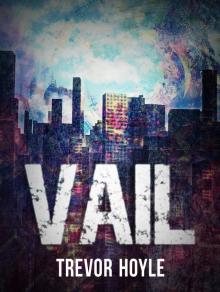 Vail
Vail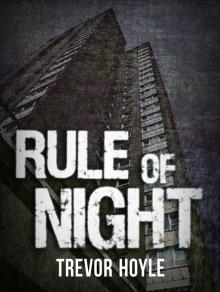 Rule of Night
Rule of Night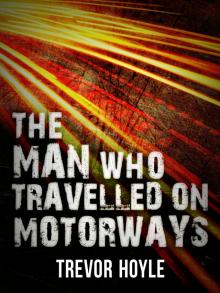 The Man Who Travelled on Motorways
The Man Who Travelled on Motorways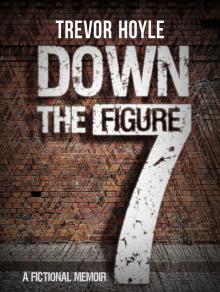 Down the Figure 7
Down the Figure 7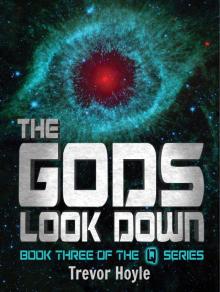 The Gods Look Down
The Gods Look Down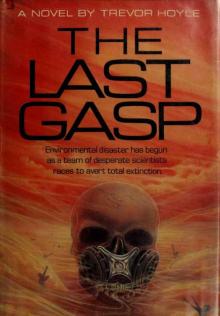 Last Gasp
Last Gasp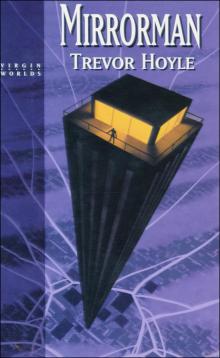 Mirrorman
Mirrorman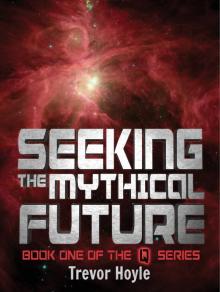 Seeking the Mythical Future
Seeking the Mythical Future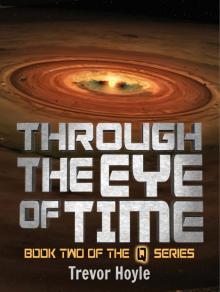 Through the Eye of Time
Through the Eye of Time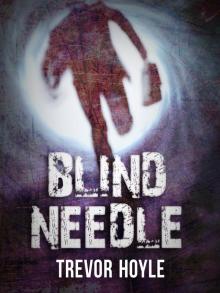 Blind Needle
Blind Needle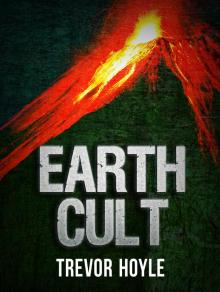 Earth Cult
Earth Cult